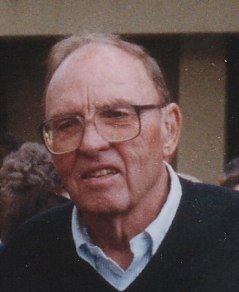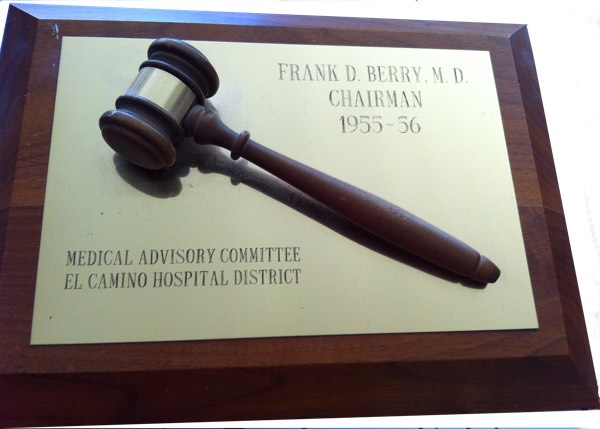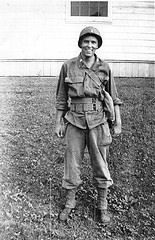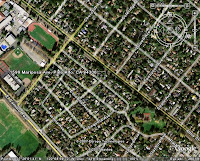From a letter from Jay from a few years ago.
Mom died on a Wednesday. I remember it being extremely hot, well over 90. I was subbing in San Francisco and I just blew off work. I felt very, very strongly that she would die that day. I drove home. The freeway was blazing hot and it was a very unpleasant trip. I remember being very scared in a way to enter the house, and I started up Eastbrook ave, got to where my old school was, and headed to Hal’s Echo for a beer. Weird thing to do, but I felt horrible about entering the house. After a surreal beer at Hal’s echo in the corner of the bar, I headed up to the house. The front door was unlocked and I just walked down the hall to see Mom. I knew when I saw Mom the Saturday before that she was very, very, close to death, so I was somewhat prepared for how she looked. That Saturday when I had walked into the room, she kind of perked up and her eyes dilated just a bit. She knew it was me, but she couldn’t talk.
This is the most difficult image I have ever seen. Excruciating.
Wednesday was in some way easier to see Mom than on Saturday when she had some consciousness left. Apparently on Saturday she had recognized and said something to Aunt Bruna. By the time I came, she was grasping to say something, but she was incapable of talking and getting the words out.
When I got to Mom’s room, dad barely noticed me. He was praying at the foot of her bed. It’s strange the things you notice, and I remember how big those rosary beads were. They were absolutely gigantic. You could use them as martial arts weapons.
I believe he was saying hail marys over mom’s unconscious body. It looked like there was very little time. For a while Dad and I sat like zombies in the TV room. There was a basketball game kind of dripping sound in the background. It was a Larry Bird game, but it was all just a big blob, a mishmash of stupid sound and squeaky shoes on the Celtics’ parquet floor.
I heard Mom die.
I was in the kitchen and I heard a loud sound, kind of a nasal sound. It was very short. I went to the TV room and told Dad that he ought to check on Mom, and that I had heard a strange sound. Dad went in and confirmed that she had passed away. Dad went into a strange state-of- shock kind of battle plan that he had already rehearsed in his mind, calling Dick Wheat and the funeral home to take her away. “The great” Dick Wheat did arrive. For a long time afterword, I always remember dad getting choked up referring to “that damn Dick Wheat.”
As many jerks as there are running around, you always have to remember the Dick Wheats running around. Finally, about a half hour after Mom’s death, these two strange characters came to the house and they loomed in the hallway, waiting to take Mom’s body away.
One guy was big and tall with a big lantern jaw. He was like that loony guy in the old Alfred Hitchcock show, a migant worker, who shows up on this lady’s door and says “I’ll pick your peaches” in this psychopath way. The other guy was short and kind of like George in Of Mice and Men. The short guy had an impatient look on his face as Dad and Dr. Wheat talked over the body of Mom lying on the bed. Finally these two strange characters were able to take Mom away in a big blanket. Hail Mary, full of grace…
These are images I seldom visit, except they still come to visit me.
I remember how mom would change from day to night. She was a classic gemini with a kind of dual personality that way. During the day with all of her chores and all, she could be very crabby. I remember her returning from the store in the afternoon and being unpleasant to be around. Mom and I did spend a lot of time in those days watching the Mike Douglas Show and the Merv Griffin show together and making comments about various things. She always had interesting takes. I remember Angie Dickenson came out one time, and mom making the comment: “She’s the kind of a woman who will go after anyone in pants.”
I must confess that to a Bellarmine sophomore this sounded like the kind of woman I wanted to find! Though I still think to this day there is something strangely sinister about Angie Dickenson. Mom was extremely intuitive. These were not opinions that were read or borrowed.
They came from her deepest intelligence. Mom could play bridge like a whiz, and was a technically very bright person, but her intuition was her greatest asset, and I don’t think I have ever met anyone with her kind of intuitive intelligence. Chris Thomas once commented to me that “your mother is really smart.” And what I think he meant (he was about 14 or so) was that mom was smart in the real sense, the intuitive, lasar-like, intelligence that operates beyond and before language and symbol. This is what I meant when I made the comment at her funeral that “mom knew what you were thinking sometimes before you thought it.” She knew people and she knew them in a deep way.
Mom was an intriguing, quirky person in many ways. I loved her very much as a person, a fellow traveler, as well as my dear mother.
— I remember her talking to the indoor plants while she watered them one afternoon. “Mom, ”I said, “do you always talk to those plants when you water them.” “Of course, I always talk to the plants,” she said, rather matter of factly.
— We all remember the famous Good Friday with Kitty Fischer. Oh, that was a strange, painful day. Mom was locked in the bathroom, crying, beside herself. I remember constantly knocking on the door: “Mom, are you all right?” It scared me to hear mom crying like that.
This was a very tough person who you could easily imagine working twenty four hour shifts in a mental ward during World War II, or having dental operations with no novacaine, causing the dentist afterwords to say to her: “You’re like a marine.” And still she was absolute jello that day.
— Why did that happen? It was the view, almost like the mountains had some kind of deep, Chekhovian sort of importance to mom. The mountains that turned the sunset colors in the summer evenings. The mountains that were in the window as she worked in the kitchen. The mountains that held huge mystical significance. I know that Mom and Dad at times had a feisty marriage, but I don’t think it was always issue related. I think in some ways the distant mountains, metaphorically speaking, were the truth to mom. The constant issues of the day were part of the world that was sometimes an annoyance beyond what she could take.
— A short pause here. I’m typing in the front room surrounded by our Indian Bottle Brush in full bloom and our epic German shepherd, Riley, is sleeping on the bed next me. Mom would have just loved Riley. This is the most beautiful German Shepherd I have ever seen. I once saw a picture of all the Rin Tin Tins all lined up, and Riley is more impressive than all of them. That’s objective! I’m not kidding. What a beautiful dog. About five minutes or so, when I was recounting the last moments of Mom’s life and all, I began to sob, and ol Riley looked over me with this extremely touching, sympathetic look. Is there anything on God’s moist blue/green planet more adorable than a beautiful German Shepherd. The nobility is endless! I am sure that Mom has met Lena up there wherever she is.
-Mom and I had a weird bond over psychic phenomena. We both were kind of fascinated with it.. Mom would read endless books on the stuff. Ruth Montgomery, Jean Dixon, the woman with Seth (I forget her name), and on and on. She would always say she didn’t believe in it, and she was a little bit embarrassed, but then you’d see her reading those same books. I’m the same way, I must confess. I am embarrassed by my interest in all of it, and for a time I subscribed to a magazine whose whole agenda is to debunk all that stuff, Skeptical Enquirer. Still… Mom had one weird dream that she always talked about. She dreamed about the place where Martha Raganese lived. She dreamed the road, the yard, the house, and she later visited Martha Raganese and the dream was spot on. She really did believe in the spirit world, and I remember one time after Granddad had died, mom said to me: “Maybe he’ll come and visit you tonight.” I was immediately seized with skin crawling horror:” YOW! Mom, that would be horrible. I don’t want to be visited by a ghost!”
Though I believe in some kind of spirit world sort of after life, I’m kind of chicken about contact with em right now.” “Oh, the spirits are usually good when they come to visit people,” Mom said, again, matter of factly. I think she was wrong about that. Bad ones definitely can come around, too.
— Mom loved music and especially melodious stuff. I think she liked a lot of the opera that Chip played, and the classical music. She sang a ton of melodic pop songs from the 30’s, and had an encyclopedic memory for all the lyrics. It was interesting for me to play records for her, because she would react to them in interesting ways.
One time she expressed a great liking for the Doors’ song, “People are Strange.”
One time I played Frank Zappa’s “Duke of Prunes,” a song with great musical qualities in it, and she remarked: “that’s like a Broadway song.” She was absolutely right, and few people glomm on to that aspect of Zappa’s music. She once was talking about the violin and she made the following comment:” violins together sound wonderful, but they don’t sound that good alone.” This is a very insightful comment, although Isaac Stern might disagree with it, or Stephane Grappeli/Jean Luc Ponty. I am grateful to Mom that she thought to have me take piano lessons. It’s been a big part of my life. Ms. Terry, the polio-stricken teacher who gave me gold and red stars when I nailed a piece down, was one of the sweetest people I’ve ever met, and you can’t do much if you don’t know your scales.
I got to be a snot nose adolescent, and mom would say: “play some of that pretty music.”
Being a jerk, I would proceed to play atonal, obnoxious music oftentimes. What a jerk.
For the CD I thought of writing something for Mom called “some pretty music” or something like that in German. It just seemed like the title should be in German. But the piece I wrote for mom is called “Etwas Musik fur meine Mutter” (Some Music for my mother) and it’s a turbulent, yearning, 19th Century flavored piece that builds to a plateau and then becomes wistful and bittersweet. The two sides, I think, to mom. I don’t think Mom would have particularly liked that piece. I think she would much prefer the song “Rhettahunji.” That is what she meant by pretty music. “Etwas Musik fur meine Mutter” is about 8 minutes long and every note in that piece had to be memorized, since I do write down notes on occasion, but with great pain, especially given my terrible graphic skills (this is why the computer software for composition will be a Godsend when I can get that going!).
Mom, I hope you’ve heard that piece somehow. Do you like it? NO! You like the more melodic stuff! I knew it!
–Mom had room-stopping charisma like nobody I’ve ever seen. I remember those dinner parties where everybody would be in full yammer, and mom would say one little thing, just one little teasing introductory remark, and the whole room would be like the E.F. Hutton commercial.
It was strange! I saw it happen again and again. I’ve never seen anyone do that. The wait was usually worth it, too, I might add.
— Mom’s thing with talk shows was always kind of interesting. She loved Joe Dolan, she had mixed feelings for Jim Eason, mixed feelings for Ira Blue, and she disliked Hilly Rose. I remember how disappointed she was getting off the phone with Hilly Rose. It was a call against Vietnam and it didn’t snap and crackle like she was hoping for.
I think Mom would probably have hated Rush Limbaugh and the new right wing shows like Michael Savage would probably enrage her. I think she would have listened to Art Bell, and if she were alive today, we would discuss the Art Bell show, of that I’m sure.
Art Bell is neck deep in trash and doo doo, but he has an ingenious sense for radio drama and dynamics. This is one area where I know what I’m talking about. I’m the biggest radio freak of all time and know all the talk shows, and even call them. The local talk show host in the afternoon is a babble first, think later kind of Pavlovian reactor Sonoma County produces with a profusion correlative to its grape harvest. I have called her about 15 times, usually about 5:30 when I am doing the dishes. Pat likes me because I am polite and always start my raging attack with “Hi, Pat, nice show you have today.” She knows me as Bill from Forestville. I can’t use my real name, because I’m a teacher, and teachers generally don’t allow other teachers to hold opinions different from their own. I would probably be blackballed from the district. That sounds paranoid, but you’d be surprised at the close-mindedness of teachers. The repressed emotions build and build until teachers, above the neck, wind up just as gnarly as the wind-scultped trunks of cypress trees.
As per mom’s politics and Tim’s associating her with “question authority” bumper stickers:I don’t think mom today would subscribe to any one political agenda. I think she would be
swayed by arguments, for example, against self-defeating governmental bureaucracy, calculating and self-interested ethnic cheerleading a la Jessie Jackson, and questionable science in the name of hysteria and government jobs for bureaucrats. Tim is right to associate mom with the “question authority” bumper sticker, though I think she would be very suspicious of the automaticism with which certain positions are taken these days. In Sonoma County people drive around with that bumper sticker, and I think: “Do these people question the numerous agencies and authority that promote the global warming scam?” Most of these people don’t question at all the authorities they choose to believe absolutely. In the case of global warming, few of these people know the arguments against the global warming thesis, or that predicting global weather patterns is an epistemological twilight zone. Many of the people who drive around with the “question authority” bumper sticker might as well be fundamentalist Christians. Both fundo Christians and eco-fundos take absolute positions, and both operate within a mythological pantheon of demons and angels, good guys and bad guys, Both are found upon the same archetype of the righteous true believer. I think mom would look askance at all of this. I think she might even draw parallels between these people and conservatives in the 50’s. There are many many haunting similarities.
However, there’s no question, she would loathe George Bush. I have a strong feeling about that.
As far as her view on the Catholic Church molestation crisis, I think mom might surprise people in this regard. Whereas, I agree with Dad that she would come down very much against the hierarchy’s failure to take action, she would also feel compassion for the priests who will be roped into this whole media hysteria. How many priests will be falsely accused of molestation?.
Will the media focus on these people?. Will people who love to refer to McCarthy and the Salem Witchcraft trials make mention of the victims of this hysteria, and there will certainly be some.
– Remember the Yahtzee craze. I loved those kind of quirky aspects to mom.
– She was so wonderful after dinner when she was relaxed and the insights and the stories would just kind of roll out of her. Mom had a ton of family remembrances of her relatives, cousins, aunts. I remember there was one funny aunt, who had trouble with the part of her body which serves to repress potential flatulence, so she was, oftentimes, busting loose at odd times. Mom had a million of these type anecdotes.. There were a lot of trips to Safeway to get licorice and/or ice cream to assuage the family sweet tooth. I treasure those little journeys, because so often she would say little pearls of wisdom, simple but profound. I remember the exact spot where she told me, as we were wheeling into the Safeway parking lot: “It ultimately doesn’t matter what other people think.” How many mothers would say that to their kids. Not enough of em. It’s why people are as boring as they often are. Their conformist habits kill the fresh, wild, interesting side of themselves.
I know I’m being harsh here. I certainly consciously repress a lot of stuff these days.
–One time mom found a pack of prophylactics in my drawer. She sort of confronted me with it and said: “Think you’re a real big shot, don’t you! I’m sure you’re using a lot of these!” She was, as usual, right, I wasn’t using a lot of those. I did have some hopes, but there weren’t a lot of those Angie Dickenson types around in those days. I think this was around 1976.
— There were some times I think mom went a little overboard. She took Bridge way too seriously, and I do think that if she was going to play with dad, she should have accepted the fact that he wasn’t always going to bid by the book. How many thursdays during high school, right around 10 o’clock, did I hear that door crash open, with mom, hurricane-like, deconstructing one of dad’s bidding errors in gory detail. It got to be very annoying. She should have just let that go, I think.
–It was always dramatic when Mom was in one of her angry phases. Martha would come scampering back to my room like a little Indian. “Mom’s on the warpath,” Martha would whisper.
“Oh, God, No!” I would think. It was like hearing a tornado alert on the local newscast.
There would be a kind of uneasy feeling in the house. Bad ions in the air. I would hide in my room, but I knew that my time would come. It was like that oft quoted comment from Joe Louis preceding the Billy Conn fight: “he can run, but he can’t hide!” Mom was in the Joe Louis role and I was in the Billy Conn position, actually, make that fetal position. I would sit there in the back room, quivering with an anxiety far beyond the realm of anxiety as it’s commonly understood, knowing that at any time, my name would come hurtling through the hall like a tomahawk. It was tricky, too, because sometimes “Frank” sounded a lot like “Jay.” So sometimes I would think, that was “Frank”, it’s dad’s time, thank you, sweet Jesus, I’ve made it through the storm! But then I’d listen for that second yell: “Oh, no, Lord that sounds a lot like Jay. Oh, no! No question, that second one was Jay!” And all hell would break loose. Sorry to say, I would be mad to have my peace disturbed, and so mom and I often went a few rounds. Later she would refer to me as the “fuck you” kid. I had brought a new phrase into the home. There were some really horrible, yammering afternoons if I recall. A lot of Sundays about 3:30 or so. Seemed to be the time for the axe to fall, for some reason.
In 1996 I wrote a poem about that last day. The poem is kind of one person’s psychic journey through this experience. Some deep unconscious stuff kind of swung the poem into a militaristic, almost preacher mode. I think it was the psyche attempting to violently strong arm this experience into a universal plea for mercy, but only after addressing the pain in some way. I like the poem, but poems only work inside you for a while. I don’t really have answers to that day.
I find it a very painful part of the puzzle.
Mom was a kalaidescope, a multi-dimensional person if ever there was one. Although she was a terrific mother, and she was able to teach us moral values in a very effective and memorable manner, I sometimes found her momhood a little tiresome in the sense that she could be almost too morality bound. I’m not sure she enjoyed her momhood that much– it was kind of a chore, and I think in some very subtle ways, some of the anger in mom was founded upon her intense perfectionism as a mom. Still, she bags an easy A plus for her momhood in the long run.






